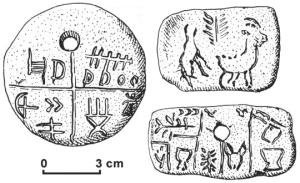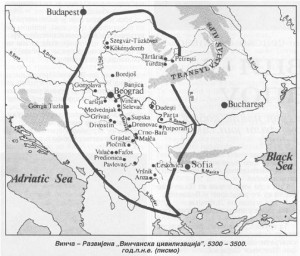Tartaria Tablets
Tartaria Tablets
The Tartaria Tablets are three clay tablets found in 1961 in Romania, which have been a source of controversy for over half a century. They are incised  with symbols that have been compared with those of the Vinca culture in the same region. If the Tablets are a genuine script they possibly pre-date the Sumerian script by a thousand years, having been dated to 5300 BC! Because Plato told us that Atlantis had writing, a few unconvincing attempts have been made to link Atlantis with the Vinca culture(c).
with symbols that have been compared with those of the Vinca culture in the same region. If the Tablets are a genuine script they possibly pre-date the Sumerian script by a thousand years, having been dated to 5300 BC! Because Plato told us that Atlantis had writing, a few unconvincing attempts have been made to link Atlantis with the Vinca culture(c).
Marija Gimbutas the celebrated archaeologist bravely declared that the Tablets were examples of the world’s earliest writing system.
Keith Massey who, along with his twin brother Kevin, has offered an interpretation of the Phaistos Disk has now produced a mathematical explanation for the Tablets and has outlined it in a YouTube clip(a).
>A 2022 blog on the Old European Culture website offers an interesting attempt to decipher some of what is referred to as the third tablet(d).<
A free 400-page book about Tartaria Tablets can be applied for online(b).
(a) https://www.youtube.com/watch?v=D_UD-Dm1ge8
(b) https://www.prehistory.it/Tartaria_book/Tartaria_book_index_.htm
(c) https://web.archive.org/web/20190830053312/https://www.black-sea-atlantis.com/black-sea-atlantis/
(d) https://oldeuropeanculture.blogspot.com/2022/01/tartaria-tablets.html *
Jirov, Nikolai Fedorov
Nikolai Fedorov Jirov was a Russian historian who held the view that the Sumerians had migrated to the Balkans and unconvincingly put forward the Tartartia Tablets(a), found in Romania, as evidence of this. He was also the author of a 1967 book, Atlantis, in which he located Plato’s island in the Azores and he also wrote the preface to Roberto Pinotti’s book, Atlantide [509].
However, there is a persistent claim that the Sumerians are related to the Hungarians, located just north of the Balkans! (b)(c)(d)
(a) https://en.wikipedia.org/wiki/T%C4%83rt%C4%83ria_tablets
(b) https://www.journals.uchicago.edu/doi/10.1086/201674
>(c) Hungarian language and Sumerian linguistic and historic comparisons, Sumerian (archive.org)<
(d) https://homepage.univie.ac.at/Johanna.Laakso/wonderbugs.html
Vinca Culture
The Vinca Culture flourished between 6,500 and 3,500 BC, in the region of  the Eastern Danube and is considered to have had contact with the better-known civilisation of Sumer. It is also accepted that Vinca influenced the development of the later Minoan civilisation. This is exemplified by the Vinca writing and its close resemblance to the Linear A script of ancient Crete and the shared motif of the double axe. The Vinca Culture developed houses arranged in streets, produced high-quality ceramics and were able to fashion copper. Furthermore, there is now (2013) clear evidence of tin bronze being fashioned around 4650 BC at a Vinca site in Serbia(a).
the Eastern Danube and is considered to have had contact with the better-known civilisation of Sumer. It is also accepted that Vinca influenced the development of the later Minoan civilisation. This is exemplified by the Vinca writing and its close resemblance to the Linear A script of ancient Crete and the shared motif of the double axe. The Vinca Culture developed houses arranged in streets, produced high-quality ceramics and were able to fashion copper. Furthermore, there is now (2013) clear evidence of tin bronze being fashioned around 4650 BC at a Vinca site in Serbia(a).
>Although there has been no suggestion of any link between Vinca and Atlantis, apart from Christian and Siegfried Schoppe, who identified the Vinca people as refugees from Atlantis(c).<
Supporters of the early date given by Plato for Atlantis see the Vinca civilisation as evidence for the possibility of a very early culture having existed and providing inspiration for the Atlantis story. Consequently, the Schoppes have suggested that the Vinca script may have provided the means whereby the Atlantis story was transmitted, relatively intact, to the Egyptians(b).
However, it must be noted that although Vinca was ‘advanced’ it came nowhere near to the detailed description of Atlantis offered by Plato.
See: Tartaria Tablets
(a) https://www.stonepages.com/news/archives/005197.html
(b) https://web.archive.org/web/20190830053312/https://www.black-sea-atlantis.com/black-sea-atlantis/
(c) The Vinca – Atlantis refugees (archive.org) *
